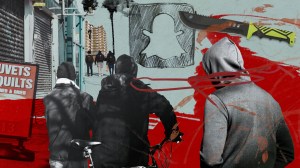Aodh Breathnach still remembers the alien feeling of the knife sliding into his skull. There’s a noise to the slice, he says, when we chat. “I felt a sensation unlike anything I’d felt before. Then I instantly thought: ‘Oh, I’m being stabbed, because I could hear the knife sticking in my head, going in and out.”
Eight years on from an altercation that led to filmmaker Breathnach being stabbed multiple times – once on each side, twice on his head and under one eye – he’s made a film. Specifically, a documentary for the BBC that explores the psychological impact of being stabbed. Over the course of an hour, Scars: Surviving a Stabbing looks at the way men process trauma, through Aodh’s own experience and others who have been stabbed and survived. Aired on BBC Three and showing on iPlayer, it culminates with Aodh reaching out to his perpetrator.
Videos by VICE
Earlier this year, we spoke about the impact of knife crime in the UK, the support Aodh wished he had at the time and what he would advise for anyone going through a similar scenario.
VICE: You ask people if you can see their scars in the doc. How do you feel about yours?
Aodh Breathnach: It’s a strange thing to have a mark on your body that reminds you of a painful memory when someone’s maybe not cared for you. After I got stabbed, I had quite a large facial scar. I thought I looked a bit rough, so I started growing my hair to try and compensate. I was stabbed twice in the head, under my eye and twice on each side – and it was the facial scar that really got to me. Apparently there are higher levels of PTSD in people with facial scars.
What happened in the aftermath of the event?
Two police officers visited me in hospital and asked for the name of the person who stabbed me. I didn’t feel comfortable giving that up – and after that, no one followed up at all. That’s probably quite a common experience. Some people would say if you’re not talking to the police, why should they help you? But since making this film, I know there are now people in hospitals – youth workers and trauma workers – who offer emotional support to society’s most vulnerable.
What support do those workers provide?
They try to make young people who’ve been stabbed aware that, if they’re going through night terrors, reliving the experience in their head, having hot flushes in the days after, that’s quite normal. But if it persists for months and months, that’s when you would expect to get support.
It’s interesting. There are two things going on. There’s the immediate trauma of the event. Then – as you mentioned – if the police aren’t following up and your perpetrator knows where you live, there’s a fear that you might get hurt again. That’s a lot to deal with.
Yeah, absolutely. After you’ve been stabbed, you’re processing this near-death experience. Almost dying does something to your brain – I felt like I was buzzing on coffee for about six months, with lots of anger and hurt mixed up in that as well. You see the world as a harsher place. To accompany all of that, with knife crime, there’s the very real threat that it could happen again. I received threats from the person who stabbed me pretty soon after. I lived in a close-knit area, where I knew I could bump into him at any moment, really. Navigating the city brought me anxiety. I didn’t feel safe at home because he knew where I lived. On some level, when you have those thoughts, you’re scared of not only what they could do, but what you might have to do, if that level of violence came to you again. And you feel like you might have to match that.
If you zoom out, how has the attack – and the subsequent film you’ve made about knife crime – made you who you are today?
Before I started filming, I’d hardly spoken about being stabbed in any depth. When I started the film, I was on the phone and talking to people about it ten times a day, or something like that. Quite quickly, it was like a valve that I’d boxed up for years was released. I felt anxiety. I felt the night terrors coming back. But over time, the more and more I spoke to people with similar experiences, I felt a bit lighter. Talking about it started to feel more natural. I’d never put that to the test before – whether pushing something that hurt to talk about would become therapeutic.
Your experience happened eight years ago. What would you advice be to a 17 year-old going through the same thing? How should they handle it, how can they move forward?
It’s really, really difficult. The first thing you can do is try and get some support. I know that in a lot of social circles, you don’t really talk about your vulnerabilities. So it’s difficult. But I would urge anyone who has been affected by knife crime to get professional support. Organizations like St Giles Trust, Catch22 – they all support young people. One step could be going to your GP. There are grassroots organizations. Open up to friends. Don’t hold it in – if you hold in that hurt and anger it comes out in other ways.
Scars: Surviving a Stabbing is out now on BBC iPlayer.


